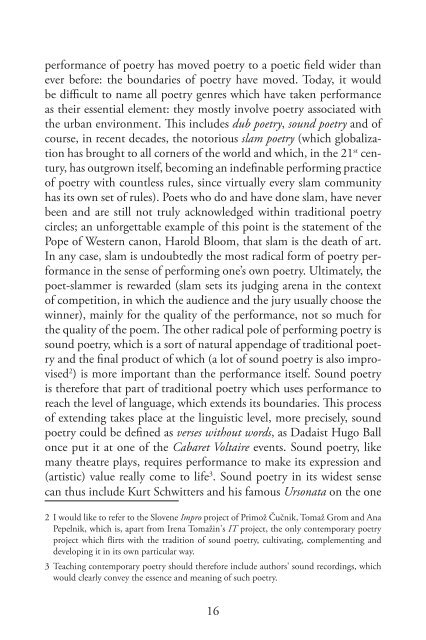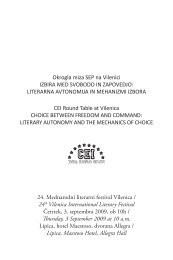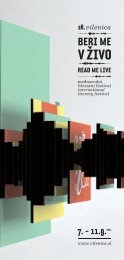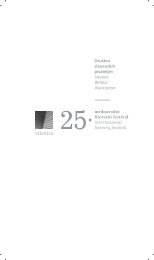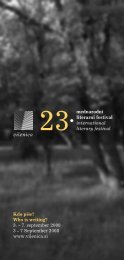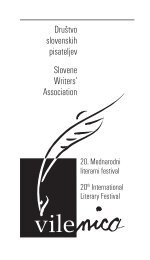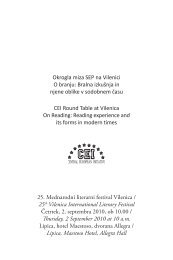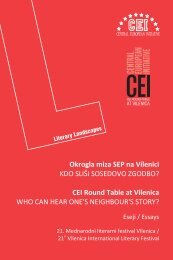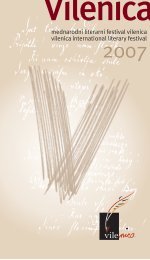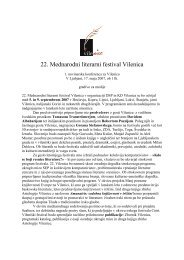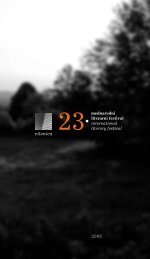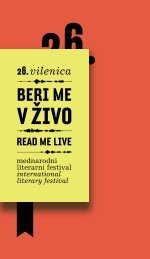Publikacija SEP 2011 - Vilenica
Publikacija SEP 2011 - Vilenica
Publikacija SEP 2011 - Vilenica
You also want an ePaper? Increase the reach of your titles
YUMPU automatically turns print PDFs into web optimized ePapers that Google loves.
performance of poetry has moved poetry to a poetic field wider than<br />
ever before: the boundaries of poetry have moved. Today, it would<br />
be difficult to name all poetry genres which have taken performance<br />
as their essential element: they mostly involve poetry associated with<br />
the urban environment. This includes dub poetry, sound poetry and of<br />
course, in recent decades, the notorious slam poetry (which globalization<br />
has brought to all corners of the world and which, in the 21 st century,<br />
has outgrown itself, becoming an indefinable performing practice<br />
of poetry with countless rules, since virtually every slam community<br />
has its own set of rules). Poets who do and have done slam, have never<br />
been and are still not truly acknowledged within traditional poetry<br />
circles; an unforgettable example of this point is the statement of the<br />
Pope of Western canon, Harold Bloom, that slam is the death of art.<br />
In any case, slam is undoubtedly the most radical form of poetry performance<br />
in the sense of performing one’s own poetry. Ultimately, the<br />
poet-slammer is rewarded (slam sets its judging arena in the context<br />
of competition, in which the audience and the jury usually choose the<br />
winner), mainly for the quality of the performance, not so much for<br />
the quality of the poem. The other radical pole of performing poetry is<br />
sound poetry, which is a sort of natural appendage of traditional poetry<br />
and the final product of which (a lot of sound poetry is also improvised<br />
2 ) is more important than the performance itself. Sound poetry<br />
is therefore that part of traditional poetry which uses performance to<br />
reach the level of language, which extends its boundaries. This process<br />
of extending takes place at the linguistic level, more precisely, sound<br />
poetry could be defined as verses without words, as Dadaist Hugo Ball<br />
once put it at one of the Cabaret Voltaire events. Sound poetry, like<br />
many theatre plays, requires performance to make its expression and<br />
(artistic) value really come to life 3 . Sound poetry in its widest sense<br />
can thus include Kurt Schwitters and his famous Ursonata on the one<br />
2 I would like to refer to the Slovene Impro project of Primož Čučnik, Tomaž Grom and Ana<br />
Pepelnik, which is, apart from Irena Tomažin's IT project, the only contemporary poetry<br />
project which flirts with the tradition of sound poetry, cultivating, complementing and<br />
developing it in its own particular way.<br />
3 Teaching contemporary poetry should therefore include authors' sound recordings, which<br />
would clearly convey the essence and meaning of such poetry.<br />
16


